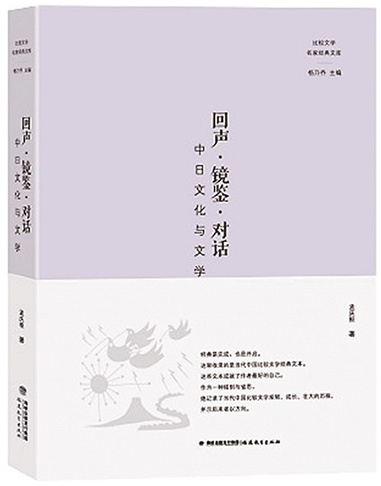
. > WHAT'S NEW > BOOKS
A comparative study of Chinese and Japanese literature
Author : GUAN XIANQIANG Source : Chinese Social Sciences Today 2022-01-10

Echoing, Mirroring and Dialogue Between Chinese and Japanese Culture and Literature
Echoing, Mirroring and Dialogue Between Chinese and Japanese Culture and Literature, written by Meng Qingshu, a famous scholar long engaged in comparative literature studies, places Japanese literature over the past century in the field of world literature and dynamically follows the multi-dimensional interactions between China, Japan, and the West, contemplating how Japan has assimilated and absorbed Western culture.
At the same time, the book proceeds from the cultural orientation of consciousness regression and rests on the Chinese classic traditional culture, in a bid to achieve the deep integration of the Chinese classic traditional culture with Japanese culture and literature, and with contemporary historical realities.
In terms of research objects, the book focuses on the grand narration of Japanese poetics, Japanese comparative literature, the history of modern Japanese literature, contemporary Japanese literature, and Japanese science fiction. It also makes close observations on Japanese writers and literary theorists, including Natsume Soseki, Ogai Mori, Nakajima Atsushi, Junichiro Tanizaki, and Kenzaburo Oe.
Meng sticks to placing these research objects in a complex existence field, adding that the literary development of any nation or country is a dynamic process, which is inevitably influenced by foreign culture and literature. Foreign culture and local culture collide and blend with each other, resulting in a variety of contradictions carrying diverse forces. After fusions, a (temporary) balance is struck, and then the same cycle continues to be repeated. In other words, literary fusion itself is a movement of contradictions.
Meng’s academic purport of consciousness regression implies his deep understanding of his cultural identity, academic horizon, and value stance, as well as cultural self-consciousness and self-confidence. He seeks the implementation path of regressive consciousness in the study of Chinese and Japanese culture and literature, namely horizontal explorations, trying to reveal the hidden Chinese cultural and literary codes in Japanese culture and literature.
For instance, the book examines the relationship between The Wild Geese by Ogai Mori and Chinese fiction The Water Margin, revealing the fatalism manifested in the former text. Seen from The Theory of Literature and Other Critical Writings, Natsume Soseki’s struggles between the Eastern and Western cultures can be found. Soseki’s “literary” nostalgia for classic Chinese culture can also be felt.
In another example, the book conducts a comparative study of the reference relationship between Kawabata Yasunari’s masterpiece Snow Country and the untitled poems and Milky Way-themed poems by the Tang (618–907) poet Li Shangyin.
Guan Xianqiang is an associate professor from the School of Chinese Language and Literature at Soochow University.
Ye Shengtao made Chinese fairy tales from a wilderness
Ye Shengtao (1894–1988) created the first collection of fairy tales in the history of Chinese children’s literature...
-
How northern ethnicities integrated into Chinese nation
2023-09-18
-
Mogao caves
2023-09-12
-
Mogao Grottoes as ‘a place of pilgrimage’
2023-09-12
-
Time-honored architectural traditions in China
2023-08-29
-
Disentangling the civilizational evolution of China
2023-08-28
-
AI ethics in science fiction
2023-08-23













 2011-2013 by www.cssn.cn. All Rights Reserved
2011-2013 by www.cssn.cn. All Rights Reserved